
How can active listening be a secret weapon to build strong business relationships and achieve its goals more quickly?
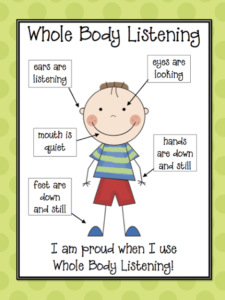
“Of all the skills of leadership, listening is the most valuable — and one of the least understood. Most captains of industry listen only sometimes, and they remain ordinary leaders. But a few, the great ones, never stop listening. That’s how they get word before anyone else of unseen problems and opportunities.”
— Peter Nulty, Fortune Magazine
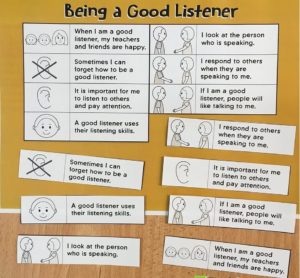
Active listening is the ability to focus entirely on a speaker. It helps understand their message, grasp the information and respond thoughtfully. It is far distinct from passive listening, which is the act of hearing a speaker without retaining their message. Active listening is highly valued interpersonal communication skill. It ensures you can engage and recall specific details later without needing information repeated.
Active listeners use verbal and non-verbal techniques. It shows and keeps their attention on the speaker. It not only supports your capability to focus but also helps assure the speaker can see that you are focused and engaged. Never think about and mentally rehearsing what you might say when the speaker is done his words. Instead, the listener carefully considering the speaker’s words and commits the information to his memory.
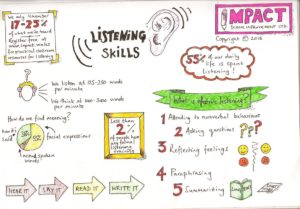
“To say that a person feels listened to means a lot more than just their ideas get heard. It’s a sign of respect. It makes people feel valued.”
— Deborah Tannen, author and professor of linguistics, Georgetown University
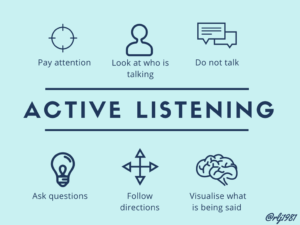
What is active listening?
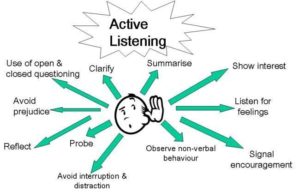
The importance of active listening in the workspace
Are you seeking a new job opportunity, striving to earn a promotion or working to improve in your current role? Then, improving your active listening skills will help you succeed. Active listening is similar to critical thinking and conflict resolution. This soft skill enables you to enhance your value as an employee.
- Building Trust:
You and your employees will become happy when you meet each other’s respective goals. As an employer, it is your organisational success. And for your employees, it is the tasks and objectives they have entrusted to complete. Therefore, it is vital to have trust in each other for healthy work experience.
Tick the following points to aware of the fact that help you build trust:
- To lend an ear to your people.
- To be honest and supportive.
- To be non-judgemental.
- To have healthy communication with them.
To tick these points, you must have a great understanding. It can get developed by active listening. It will help align your words and actions and help build trust.
- Productivity:
Active listening has endless benefits when it comes to employee productivity.
Sometimes, higher managers do not hear the views and ideas of the employees. It fuels employees’ resentment, which results in low productivity. So, you must get proper feedback and consider the opinions of the employees. It is necessary for a healthy workplace and performance. It is also inevitable to ensure that the stream of communication flows from both the direction. Then only a culture of mutual trust and understanding can get developed. It is always a two-way process.
- Resolves Conflicts:
Conflicts and mishaps are unavoidable in any workspace. The reasons for this can range from a minor error or a major disaster.
Disputes, diverse viewpoints or a lack of recognition often create conflicts in the workspace. Nothing is there a good communication cannot resolve. Here when we say ‘good communication’, we mean active listening.
We often fail to understand or respect other’s opinions as we never see things from their point of view. Our sense of self-righteousness also interferes here. Active listening helps in understanding other’s perspectives and feelings and helps us appreciate them. It not only helps in resolving conflicts but also helps foster a culture of respect.
“Most of the successful people I’ve known are the ones who do more listening than talking.”
— Bernard Baruch, American financier and presidential advisor
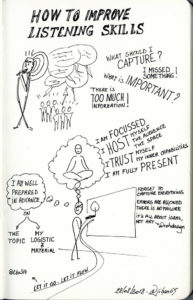
Strong Work Relationship:
It is crucial to forming healthy work relationships in the workspace for healthy work experience. There are two types of listening. They are ‘listening to understand’ and ‘listening to respond’.
People who listen to understand can form better relationships, and they are more empathetic in their approach. The same holds for work relationships. The more members in a workspace follow this approach, the better work relationships they form.
- Self-Empowerment:
Self-empowerment helps you boost your confidence and let go of your agendas. You should practice active listening and understand what is beneficial for you in the workspace. It expands your outlook in that direction and empowers yourself. You become more aware of your work atmosphere. You will communicate with your peers and colleagues with much ease and confidence.
- Acceptance:
Every firm has its own culture, and each member adds value to it. The root of this culture begins with acceptance. Yes! Acceptance of its values and mission by all its members.
For every company to succeed, both its employers and employees must be aligned with the common goal. They need to accept each other for their respective parts. They should actively listen to each other while carrying out their job duties.
At the time of onboarding new employees, management must listen to their feedback and views on various aspects of the company. It reduces confusion and gives a sense of acceptance to them. Therefore, active can be a great morale booster.
The Bottom Line
Active listening is a skill that can get acquired. And if you have arrived at this part of the blog, then we assume that you would ready to practice active listening in your workspace. We hope the tips mentioned above help you achieve that or at least educate you on the topic.
Remember! Understanding and encouraging the speaker to speak, focus, and keeping broad perspectives is the key.
“You have to be willing sometimes to listen to some remarkable bad opinions. Because if you say to someone, ‘That’s the silliest thing I’ve ever heard; get on out of here!’ — then you’ll never get anything out of that person again, and you might as well have a puppet on a string or a robot.”
— John Bryan, former CEO, Sarah Lee Corporation




